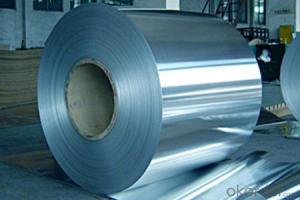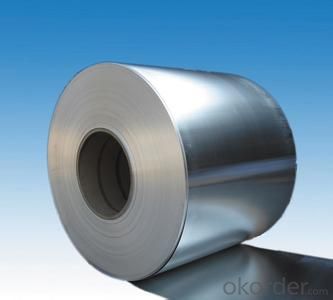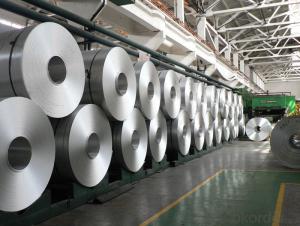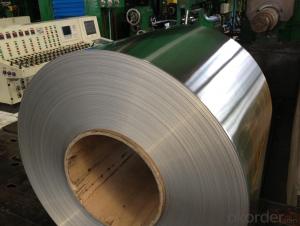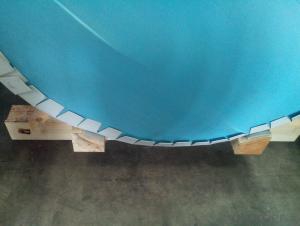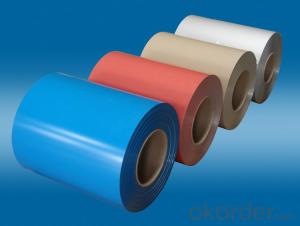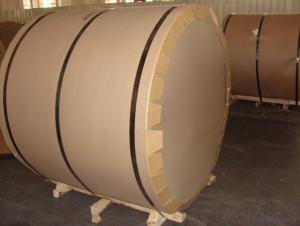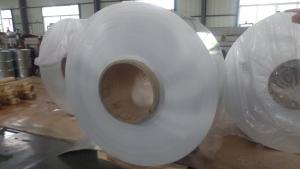5x7 Aluminum Sheets - AA5182 Aluminium Coils for Can End Stock
- Loading Port:
- Shanghai
- Payment Terms:
- TT OR LC
- Min Order Qty:
- 20 m.t.
- Supply Capability:
- 50000 m.t./month
OKorder Service Pledge
OKorder Financial Service
You Might Also Like
Specification
1.Structure of Aluminium Can End Stock
Aluminium Coils for aluminium can end stock is one semi-finished aluminium material. This strip can be used to produce aluminium tab for beverage can. The alloy AA5182 is widly used in can tab, end and can body. Its weight is much lower than steel. So many customers choosed aluminium material instead of steel.
2. Main features of Aluminium Can End Stock
a.Competitive price---We have our own mills and can produce mill finished aluminium coils, so we can control the production cost better.
b.Professional after-sale service---We have more than 15 years exportation experience and you need not worry about the exporation problems.
c.Fast delivery time---We can control the delivery time within 35 days.
3. Image of Aluminium End Stock
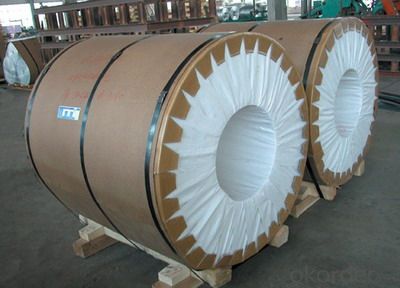
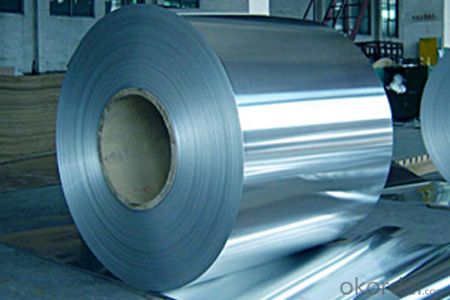
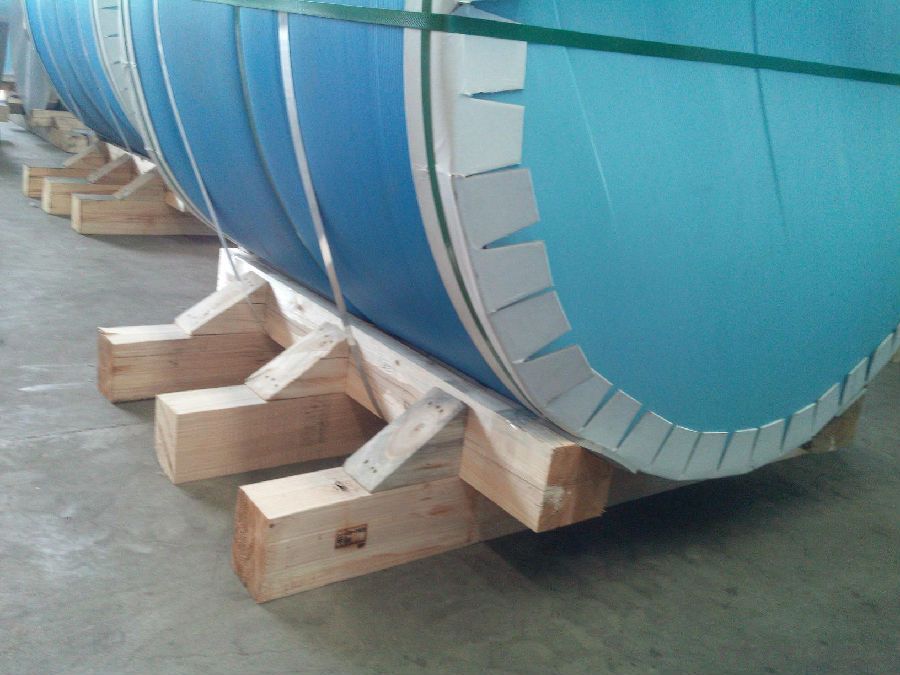
4. Product Specification of Aluminium End Stock
| Alloy | Temper | Thickness | Width | Weight |
| AA5182 | H19 | 0.22mm-0.26mm | 600mm-2000mm | 2tons |
5.FAQ of Aluminium End Stock
What is the quality standard?
---Usually our standard is GB3880-2006
What is the largest width?
---It is 2300mm
What is the MOQ?
---Usually we can accept 20 tons.
- Q: Can aluminum sheet be used for automotive heat shields?
- Yes, aluminum sheet can be used for automotive heat shields. It is a commonly used material due to its high thermal conductivity, lightweight nature, and excellent heat resistance properties.
- Q: or aluminum ? and what other gases are released?
- Aluminium does not normally react with water because of a surface coating of the highly unreactive Al2O3 that forms on exposure to atmospheric oxygen. In the presence of strong base, however, this compound dissolves due to complexation by hydroxide, similarly to how silver chloride dissolves in ammonia. Al2O3(s) + 2OH-(aq) + 3H2O(l) ----- 2[Al(OH)4]-(aq) Once this has occured, aluminium metal, a very strong reducing agent, is exposed to water. 2Al(s) + 6H+(aq) ----- 2Al3+(aq) + 3H2(g) Even though the solution is alkaline, there is still a low concentration of H+ formed by the autoprotolytic dissociation of water. The Al3+ formed then reacts with hydroxide to produce more [Al(OH)4]-. Yes, the hydrogen gas is from the water.
- Q: Are aluminum sheets suitable for insulation cladding?
- Aluminum sheets are a suitable option for insulation cladding. This material is highly versatile and durable, commonly used in construction for multiple purposes, including insulation cladding. The thermal properties of aluminum sheets are excellent, effectively preventing heat transfer. Additionally, their low thermal conductivity ensures improved energy efficiency by minimizing heat transfer between the building's interior and exterior. Moreover, aluminum is lightweight and easy to handle, making it convenient for installation purposes. It is also resistant to corrosion, allowing it to withstand various weather conditions and remain a long-lasting choice. Furthermore, aluminum sheets are available in different thicknesses, providing customization options based on specific insulation requirements. Not only do aluminum sheets possess functional benefits, but they also enhance the overall appearance of the building. With their sleek and modern look, these sheets can be easily painted or coated in different colors to match the desired aesthetic design. In conclusion, aluminum sheets are an excellent choice for insulation cladding due to their thermal properties, durability, ease of installation, and aesthetic appeal.
- Q: i need to know these things please....can aluminium withstand the forces of being in a cargo hold on a air freight, can it withstand extreme temps and to what extent an is it microwavable?? please help me
- No metals are microwavable, they will ruin any microwave oven by producing sparks. Even ceramic plates with a little metallic paint eg of silver will spark. Aluminium on its own has little strength but when mixed with small amounts of eg copper or manganese it aquires great strength while remaining light. In addition it has the advantage of being very resistant to oxidation and corrosion. It is certainly used extensively in aircraft construction. Due to being non toxic it used to make cans for beers, soft drinks (sodas) etc However it doesn't stand up well to high temperatures, its melting point is just at 660 degrees celsius, by comparison for iron it is 1540 and tungsten 3420.
- Q: Are aluminum sheets suitable for HVAC systems?
- Indeed, HVAC systems find aluminum sheets to be a fitting choice. As a lightweight and sturdy material, aluminum boasts exceptional thermal conductivity, rendering it highly suitable for integration into HVAC systems. It frequently serves as the base for crafting ductwork, heat exchangers, and fins within air conditioning units. Moreover, aluminum sheets exhibit corrosion resistance, which proves advantageous in settings with elevated humidity levels or instances of moisture exposure. Furthermore, aluminum stands as an eco-friendly alternative as it can be recycled, solidifying its status as an environmentally conscious option for HVAC systems. All in all, aluminum sheets present a multitude of advantages and remain widely embraced within the HVAC industry.
- Q: Are the aluminum sheets suitable for signage or advertising purposes?
- Aluminum sheets are an excellent choice for signage and advertising purposes due to their high suitability. The versatility and durability of aluminum make it resistant to rust, corrosion, and weathering, which is ideal for outdoor use. Furthermore, its lightweight nature facilitates effortless installation and transportation, while the smooth surface adds a touch of professionalism and sophistication. The customizable nature of aluminum sheets allows for easy cutting, shaping, and engraving, enabling designers to create captivating signs and advertisements. Additionally, aluminum sheets can be directly printed on or laminated with vinyl to achieve vibrant and long-lasting graphics. In summary, the remarkable properties of aluminum make it the perfect material for signage and advertising purposes.
- Q: Can aluminum sheets be used for sound insulation?
- Yes, aluminum sheets can be used for sound insulation. Aluminum has good soundproofing properties due to its high density and ability to reflect sound waves. When used as a barrier or in combination with other sound-absorbing materials, aluminum sheets can effectively reduce noise transmission.
- Q: Can the aluminum sheets be used for manufacturing heat exchanger fins?
- Indeed, the utilization of aluminum sheets is possible in the production of heat exchanger fins. Owing to its remarkable thermal conductivity and resistance to corrosion, aluminum stands as a frequently employed substance in heat exchangers. The lightweight and easily malleable attributes of aluminum sheets render them exceptionally suitable for the creation of fins that possess an extensive surface area, thereby augmenting heat transfer. Furthermore, aluminum is readily accessible and cost-efficient, solidifying its status as a favored selection within the realm of heat exchanger manufacturing.
- Q: Are aluminum sheets suitable for medical equipment?
- Yes, aluminum sheets are suitable for medical equipment. They are lightweight, durable, and have high corrosion resistance, making them ideal for various medical applications such as surgical instruments, diagnostic equipment, and prosthetics.
- Q: It seemed in my experiment that aluminum wasn't reactive at all in the displacement reactions, except with copper sulfate. Is there a reason? or did I make a mistake? aluminum is more reactive than e.g silver nitrate, why didn't it react with it?
- Aluminium has a protective coating of Aluminium Oxide, this prevents many chemicals reaching the surface. This is because aluminium has a very strong affinity for oxygen and bonds to it with extremely strong bonds. It can be removed by dipping it carefully into a solution of Mercury (II) Chloride.
Send your message to us
5x7 Aluminum Sheets - AA5182 Aluminium Coils for Can End Stock
- Loading Port:
- Shanghai
- Payment Terms:
- TT OR LC
- Min Order Qty:
- 20 m.t.
- Supply Capability:
- 50000 m.t./month
OKorder Service Pledge
OKorder Financial Service
Similar products
Hot products
Hot Searches
Related keywords
